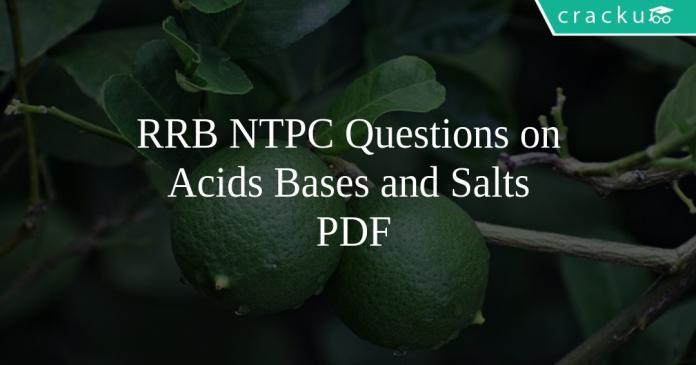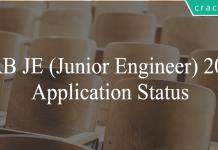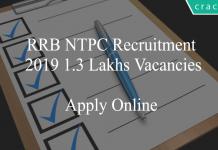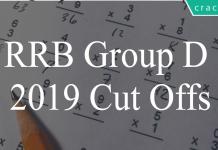RRB NTPC Questions on Acids Bases and Salts PDF
Download RRB NTPC Acids Bases and Salts Questions PDF. Top 10 RRB NTPC questions based on asked questions in previous exam papers very important for the Railway NTPC exam.
Download RRB NTPC Questions on Acids Bases and Salts PDF
Take a free mock test for RRB NTPC
Download RRB NTPC Previous Papers PDF
Question 1: Ethanoic acid is commonly called?
a) Sulphuric acid
b) Acetic acid
c) Sulphonic acid
d) Hydrochloric acid
Question 2: Which of the following statements is INCORRECT?
I) Bleaching powder is a pale yellow powder
II) Dry $NH_4$ gas turns red litmus blue
III) The pH of rain water is nearly 5.6
IV) The pH of acid rain is nearly 4
a) I), II) and IV)
b) I), II) and III)
c) All of the above statements are correct
d) Only II)
Question 3: Which of the following statements is wrong with regard to strong acids?
a) Strong acids react very rapidly with other substances (such as metal carbonates and metal hydrogen carbonates).
b) Hydrochloric Acid, Sulphuric acid and Nitric Acid are strong acids.
c) Acids are those chemical substancesthat havea salty taste.
d) All minerals acids are strong acids.
Question 4: Acids that contain Hydrogen and other non-metallic element(s), except Oxygen, are called:
a) Hydracids
b) Dilute acids
c) Strong acids
d) Weak acids
Question 5: ………. is the process in which acids and bases react to form salts and water.
a) Distillation
b) Electrolysis
c) Neutralisation
d) Hydrolysis
RRB NTPC Previous Papers [Download PDF]
Question 6: Which of the following solutions is the most acidic among them all?
a) Solution with pH value 0
b) Solution with pH value 6
c) Solution with pH value 1
d) Solution with pH value 7
Question 7: Oxides of metals are basic in nature, that is, they combine with acids to form salt and water. Select the odd metal oxide from the following ones.
a) $ Al_{2}O_{3} $
b) $ Na_{2} O $
c) MgO
d) CaO
Question 8: Which of the following salts is acidic in nature?
a) Sodium Carbonate
b) Ammonium Phosphate
c) Magnesium Sulphate
d) Sodium Acetate
Question 9: Metal oxides which react with acids as well as bases are called:
a) Amphoteric oxides
b) Neutral oxides
c) Basic oxides
d) Acidic oxides
Question 10: Which of the following indicators CANNOT be used for distinguishing between acidic and neutral solutions?
a) Eosin
b) Universal indicator
c) Phenolphthalein
d) Methyl orange
Question 11: The gas evolved when sodium carbonate reacts with hydrochloric acid is ………..
a) Hydrogen
b) Chlorine
c) Hydrogen Chloride
d) Carbon dioxide
Question 12: The pH of a solution is 3. When its pH changes to 6, then $H^+$ ion concentration:
a) increases 2 times
b) increases three times
c) decreases 1000 times
d) decreases 100 times
Question 13: What is diluted acetic acid commonly known as?
a) Oleum
b) Blue vitriol
c) Vinegar
d) Alum
Question 14: What will happen to the boiling point and freezing point of water when some common salt is added in it?
a) Boiling point elevation, freezing point depression
b) No change
c) Only boiling point increases or decreases
d) Boiling point depression, freezing point elevation
Question 15: ‘Alum’ is an example of
a) Flake salt
b) Table salt
c) Single salt
d) Double salt
Download General Science Notes PDF
Answers & Solutions:
1) Answer (B)
2) Answer (D)
Dry $NH_4$ does not have any effect on litmus.
3) Answer (C)
4) Answer (A)
5) Answer (C)
6) Answer (A)
7) Answer (A)
8) Answer (A)
9) Answer (A)
10) Answer (C)
11) Answer (D)
12) Answer (C)
13) Answer (C)
14) Answer (A)
15) Answer (D)
DOWNLOAD APP FOR RRB FREE MOCKS
We hope this Acids Bases and Salts Questions pdf for RRB NTPC exam will be highly useful for your Preparation.





